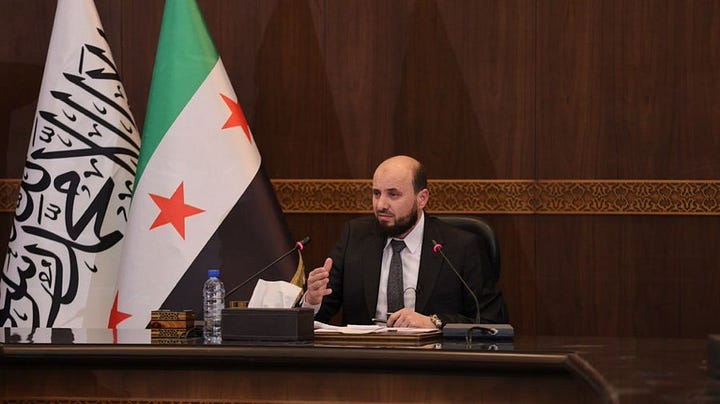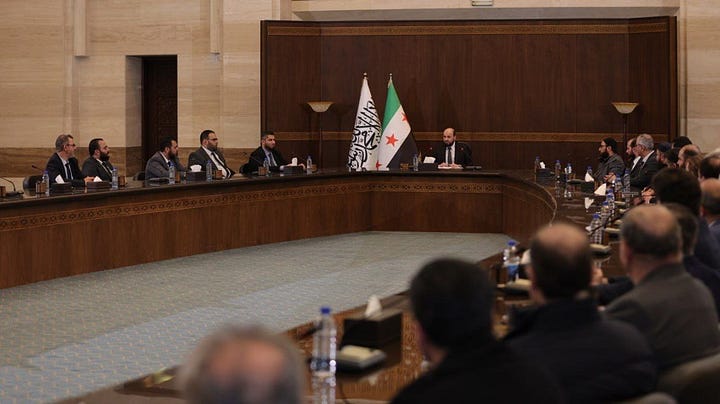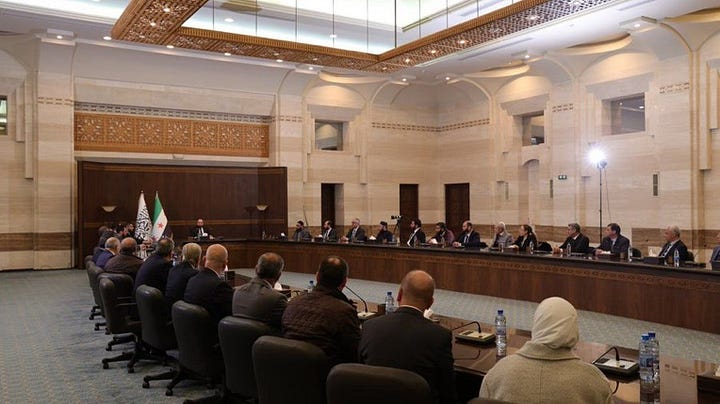Amid euphoria of Assad’s fall, anxiety about governing Syria
‘Running Idlib is one thing. Trying to run a whole country is something very different. …remains to be seen whether this coalition that brought the revolution is going to hang together,’ ex US envoy




I have a Syrian friend who has long advocated for the ouster of Syrian dictator Bashar al-Assad. Based now in the United States with his family, he has long tried to help educate journalists and policymakers on developments in Syria, and the best course of policy he thought the West might make.
So during the stunning events over the weekend, as Syrian rebel forces advanced, and Assad’s forces evaporated seemingly almost without a fight in city after city, culminating in Assad fleeing to Russia on Sunday, I was often thinking of my friend.
At long last, and largely unexpectedly, he and other Syrians were able to see this monstrous dictator, who was responsible for the death of hundreds of thousands and the displacement of millions over the course of Syria’s uniquely barbaric civil war, toppled. And by email over the weekend, he said he was happy.
So I was struck when we spoke on Tuesday, that he expressed some misgivings, though he also noted that it had only been three days. (I am not naming him here so he could share some of his thoughts more candidly.)
Photos from the Syrian capital Damascus on Tuesday showed the surreal scene of the intransigent Assad’s former ministers sitting at a huge table with representatives of the Turkish-backed Syrian rebel group, Hayat Tahrir al-Sham (HTS), that entered Damascus on Saturday and moved to form an interim government. Behind the HTS-appointed interim Prime Minister Mohamed al-Bashir stood two flags: the green, white and black Free Syrian flag of the broad anti-Assad coalition; and HTS’s white flag with black writing, that represented the jihadi rebel group that has run the northwestern Syrian city of Idlib the past several years.
This does not represent me, my friend said. Damascus—the multiethnic Syrian capital that is one of the world’s oldest continually inhabited cities--is not a small rebel outpost like Idlib.
As I understood him, he didn’t want Assad ousted only to be replaced by a sectarian Sunni Islamist rebel group.
Or, as President Biden put it Sunday: “It would be a waste of this historic opportunity if one tyrant were toppled only to see a new one rise up in its place.”
HTS has seemingly made concerted public relations efforts since its stunning seizure of Syria’s second largest city of Aleppo late last month to express tolerance for Syria’s non-Sunni religious and ethnic minorities. HTS grew out of Al Qaeda in Iraq, but later fought against it and ISIS. It was listed as a terror group by the United States in 2018.
“We did not pay all this blood and displacement in order to create a new Hezbollah in Syria with a Sunni flavor,” Mustafa Backo, a Syrian American immigration attorney, wrote on Twitter, (via translation from Arabic), responding to the photo of the HTS Islamist flag displayed alongside the free Syrian flag at the interim government meeting in Damascus on Tuesday.
“Why is the head of the transitional government addressing Syrians with an Islamic flag on display,” Syrian journalist Rami Jarrah tweeted. “This man is supposed to represent all Syrians of all religious backgrounds.”
Many anti-Assad Syrian pro-democracy activists urged Washington and its allies to keep the pressure on HTS, by making any lifting of the terror designation and recognition conditional on HTS guaranteeing protection of Syrian human and minority rights, pursuing inclusive policies and multi-party power sharing.
“The only effective way to counter radical tendencies is to make recognition, delisting and the lifting of related sanctions conditional on credible guarantees of basic individual rights—including women’s rights—and the adoption of inclusive policies,” Syrian pro-democracy activist Ammar Abdulhamid, now based in Maryland, wrote on Twitter.
Western governments seem to share those convictions.
Syria’s post-Assad political transition process “should lead to credible, inclusive, and non-sectarian governance,” Secretary of State Antony Blinken said in a lengthy statement setting out the US position on Tuesday. “The United States will recognize and fully support a future Syrian government that results from this process.”
“It’s up to the group [HTS] to demonstrate its sincere desire to reject extremism, reject Islamism and jihadism in this transition and, above all, [to] organize a transition enabling all Syrian minorities…to play their full role,” French Foreign Minister Jean-Noel Barrot, said in an interview Dec. 9.
“We’re being very cautious,” he said. “And I say this: France’s support will be conditional on respect for minorities and human rights.”
There are signs that the incoming Trump administration is likely to keep the pressure on HTS to move to an inclusive, multi-party political process.
HTS leader Abu Muhammad al-Jolani “must be delusional if he thinks that Syrians, having seen the departure of a 54- year dictatorship [on Sunday], will sit still as he installs himself as another dictator in Assad’s place,” Joel Rayburn, who served as US envoy on Syria during Trump’s first term, wrote on Twitter Monday.
“Jolani and HTS, a listed terror organization, are also delusional if they think the world and Syria’s neighbors will support his HTS-dominated ‘salvation government’ as it imposes a transitional government on all Syria that circumvents the UN-led…political process.”
Even amid the exultation among many at Assad’s departure, governing Syria in the wake of the tyrannical Assad police state will be an immense challenge, said former US Ambassador to Syria Ryan Crocker.
“Running Idlib is one thing,” Crocker said on a Zoom hosted by the Middle East Institute Tuesday. “Trying to run a whole country is something very different. And it also remains to be seen whether this coalition that brought the revolution is going to hang together in the post-revolutionary order.”
The Syria state was rotting from within under the last several years of Assad’s brutal rule, said MEI’s Charles Lister.
“I think the regime had been decaying from the inside for a very long time,” Lister said on the MEI Syria Zoom Tuesday. “And the rot,… plus the absolute collapse of the Syrian economy, meant that the only thing that was holding Syrian conscripts in the Syrian military was money. It wasn't loyalty to the regime. It certainly wasn't loyalty to Bashar.”
“And the moment that a glimmer of light at the end of the tunnel appeared, those front lines collapsed, one after the other,” Lister said. “And you could watch it play out. … Syrian soldiers just gave up the moment they knew that the game was finished.”
A Damascus-born woman from Syria’s Christian minority currently living in the U.S. told me that many people she knows back home in Syria are “petrified.”
“They're scared right now,” the Syrian woman, speaking not for attribution, said Tuesday. “This guy Jolani is saying all the right things, but also all the cameras are on him. Everyone in the West is watching.”
“He’s a very ambitious man…. and he knows that this is his way to get to a stage” where he could hold a post of major influence in Damascus, she said. “People are scared, because just four years ago, HTS [under an earlier iteration, Al Nusra Front] … were killing minorities, they were killing Alawites, and they were killing Christians.
“Where do we go from here?” she said. “Best case scenario: I think we actually have a pluralistic government, if the U.S. and other Western countries actually apply pressure on HTS…. and they tell him, we'll remove the terrorist designation if you have an inclusive government to give him an incentive to do that. Maybe, just maybe, that could work.
“But with that being said, you have to remember that Syria is…not a democratic country,” she said. “The institutions don't function properly. … So it could descend into chaos very quickly.”
Update: The HTS-led interim government in Damascus apparently has since removed the white HTS flag some Syrian pro-democracy activists cited above found disturbing.
Photo: First meeting of the HTS-led Syrian transitional government with ministers from the HTS-led Salvation Government and ministers from the former Assad regime, in Damascus, Syria, on December 10, 2024. Posted to Twitter by Aaron Zelin.
**


